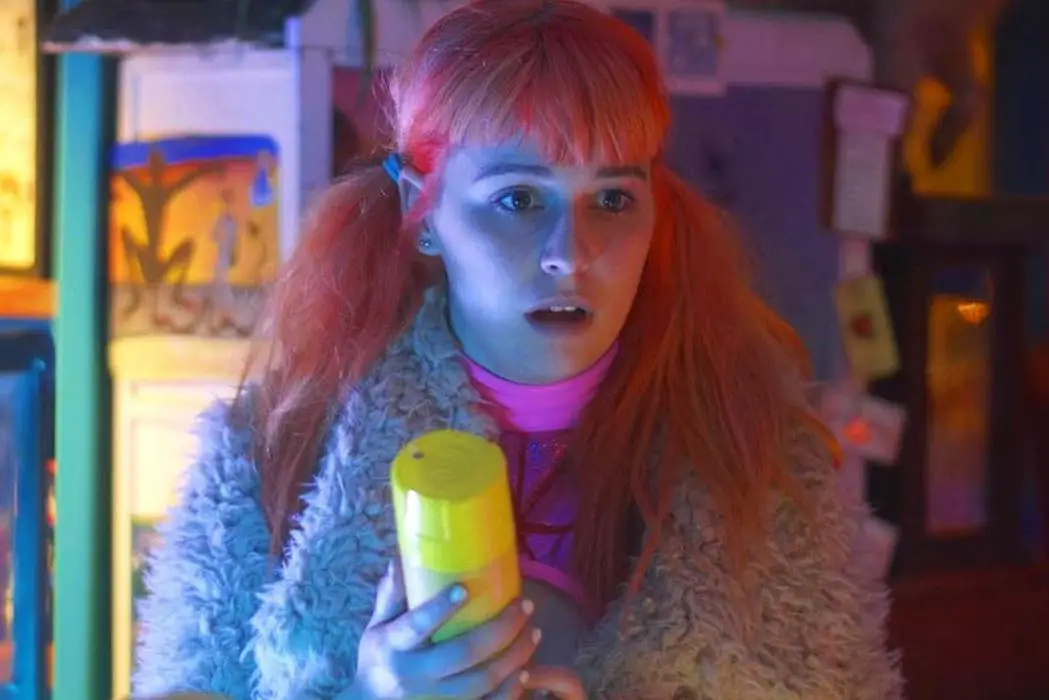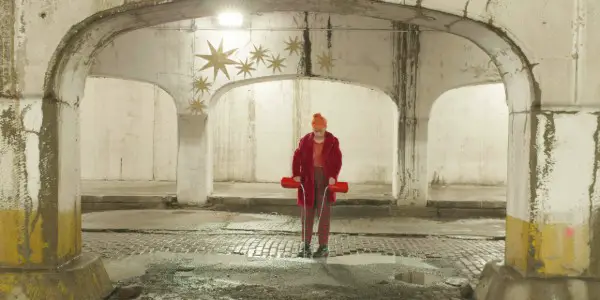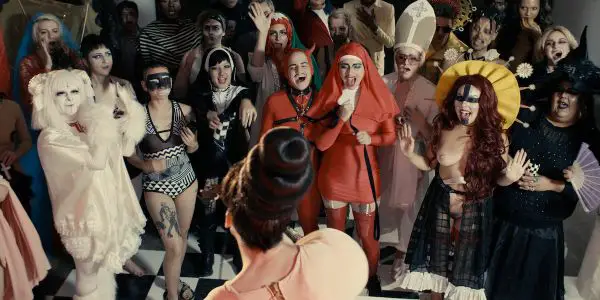Molly Hewitt’s HOLY TRINITY & The Meaning Of Life In Dystopia

Jim Dixon retired from practicing law not a moment too…
Performance artist and filmmaker Molly Hewitt makes their feature debut with Holy Trinity, set to world premiere at Outfest Los Angeles on Friday, July 19th. The story of a sex-positive dominatrix in Chicago who discovers a newfound (and maybe drug-induced) talent for speaking to the dead. Hewitt wrote, directed and stars in this wild ride of alternative spirituality and alternative sexuality.
Molly Hewitt spoke exclusively to Film Inquiry about Holy Trinity, alternative sexuality, lifestyles and spirituality, and life in dystopia.
Jim Dixon for Film Inquiry: No pressure, but everybody tells me that you are going to be the most entertaining interview that I’ve had in ages.
Molly Hewitt: Well, hopefully I won’t disappoint [laughs].
Let’s talk about Holy Trinity. I’ve seen this billed as a horror/comedy and I don’t think that describes the movie. I would’ve said it was a surreal meditation on spirituality seen through the eyes of a group of young people with alternative lifestyles. Comedy certainly, but it didn’t scare me at all.
Molly Hewitt:Yeah, it’s definitely not a horror movie at all. But I think it’s so funny.
The main character, Trinity, whom you play, does talk to dead people but that’s the only horror movie element in it. Not only are you the star of the movie, but you wrote and directed it as well, so we’d be inclined to think that the attitudes expressed in the movie are yours. The movie would lead me to suspect that you may have had some negative experiences with Catholicism growing up. Would you like to comment on that?
From Catholicism to Alternative Spirituality
Molly Hewitt:Yes, I would love to comment on that. I went to Catholic school, I was not raised Catholic but I always went to Catholic schools. I grew up in England and the schools that I went to were somewhat religious but nothing that really hit me over the head with it. And then I went to Catholic school when my family moved to Los Angeles—an all-girls school—and I was friends with people who had similar feelings toward it that I did, but I definitely found it oppressive and developed some strong negative opinions about that organized religion specifically…
I finished high school, and everything that I was experiencing was the exact opposite of what I had been told [in Catholic school] and then I began learning about different spiritual practices, and found that there are other practices that also completely go against the grain of Catholicism, and just realized more and more that everything we kind of do in our country is very puritanical and restrictive. So yeah.
I kind of expected that there might have been something like that because the religious imagery in the movie is notably irreverent—there’s no judgment there—it’s just that you can’t help but notice.
Molly Hewitt:Oh yeah, it’s definitely intentional.

Your character Trinity starts hearing voices of dead people when she’s huffing a scented aerosol can. That does raise the specter that these could be drug-induced hallucinations. Do you want to tell us how we should take it, or is that strictly up to the audience?
Molly Hewitt:I think it’s up to the audience but it is initiated by her huffing a scented aerosol can—but there are definitely opinions throughout the film from other characters, as well as hints or suggestions that it might not be exclusively from the aerosol can and there might be other reasons why she is experiencing these things.
What gave you the initial idea for the movie?
Molly Hewitt:I had seen these sort of holy aerosol cans in a variety of different botánicas and magic stores around Chicago and candle stores—I don’t know if you’ve ever seen them before—but they’re really similar to what’s in the film. They’re for different saints or orishas, or just simply for different intentions like to gain money, to have good luck, or for the devil to be gone or to find love, and you are supposed to spray them in your house and they will hopefully invoke those things for you. So I sort of came up with the idea of what would happen if somebody huffed it and what if they were able to then speak to the dead.
Do-It-Yourself in Chicago
I have not run into this product but that’s interesting. How important was making this movie in Chicago?
Molly Hewitt:I think it was really important because I live here and I love Chicago and all of my friends who collaborated are here, so I didn’t think it would make any sense for me to travel to make it anywhere else. But I also think that because I collaborated with so many artists and non-actors to make the film it is really unique to my own experience and my friends and community here.
I also think that Chicago has a kind of different lifestyle to other cities, specifically LA where it’s kind of like the filmmaking capital. I think the people are more down to experimenting here, and to collaborate and to work on something cool and do something DIY. I guess that we wouldn’t have been able to do that if it hadn’t been in this very kind of DIY spirit.
What was the biggest challenge you faced making Holy Trinity?
Molly Hewitt:I think just because it was so ambitious and there were so many elements and so many people…I think working with non-actors who are portraying themselves is a really delicate process, making sure that they feel good about how they are being represented. Wanting everyone to be happy and not wanting it to enter a realm of stress, I guess.
You did have a number of non-actors in this movie. Were these people from outside the theater community or artistic community?
Molly Hewitt:It’s a mixture. Some of the people that were in it are non-actors, non-performance artists. There are a couple of people in there who are definitely neither but I also feel like everyone who I worked with was a natural at it. Maybe they didn’t have theatrical or acting training but I think it really helped me having a personal relationship with everyone as far as directing. I feel like you probably get something special working with non-actors that you may not get with people who’ve been trained.
The movie deals with some very age-old questions. The meaning of life, the nature of God, what happens after death and this movie would seem to say that to a lot of people traditional organized religion is not providing the answers to those questions. Do you think that is a fair assessment?
Molly Hewitt:I guess I feel like there are no answers to those questions and that organized religion provides people with faith and something to believe in and something to sort of surrender to and follow a rule book and I can totally understand why people need those things or want those things. One of the characters in the movie says, people just want to believe in something that makes them think that everything is going to be okay, and I think that is what organized religion provides for a lot of people but I guess my argument is would be that you can find that in other places.
I think the most important thing that religion does provide is community, and we all really need that, but that it could be provided in other ways—in a way that you don’t have to follow this oppressive, dogmatic rulebook. That you could still have—you could still potentially get the answers you are looking for without following those religions.

Splinters of God Looking Back at God
If I were looking at a movie from the standpoint of a traditional three-act structure, I would be inclined to think that the dialogue in the third act, towards the end of your movie, where we hear the theory that God splintered himself or itself into a lot of tiny fragments to look upwards and that we are all those fragments in a sense, I would think that was meant to be sort of an answer to some of those questions, at least as far as the movie is concerned. Am I reading too much into that?
Molly Hewitt:No, definitely, I think that’s right. I do personally believe that the word “god” doesn’t always have to be taken so literally—that it can be describing different things. That scene in particular, all of the scenes with dialogue like that, were co-written with the actor playing that character, Carol, who was played by Health Lynn, and she wrote that line. She also helped me give the film more of that kind of structure, so that there definitely is an answer, but it also like a non-conclusive answer. It’s not necessarily this concrete sort of this is what’s been happening throughout the whole film. It still leaves it a little open-ended, I think.
Dominants and Submissives
How does Trinity’s relationship with Baby factor into all of this?
Molly Hewitt:I think that Trinity’s relationship with Baby is that they have been together for not a super long time, but long enough for them to be living together, They’ve been doing things with a really particular dynamic of her being dominant over Baby, but they hadn’t explored other things or their relationship with more depth, and then Trinity ends up becoming pretty self-involved and self-centered and that really limits their relationship. I think I was looking at it as kind of that particular dynamic being a BDSM dynamic, and how it kind of reflects on dynamics with people in everyday life and also our relationship to spirituality and religion.
It would seem that in a BDSM relationship the submissive is the one who actually has the real power, since the submissive has to make the conscious decision to submit to the will of another person. It seems to me that Trinity kind of gets a rough lesson in that when Baby simply refuses to put the collar back on.
Molly Hewitt:Yeah, definitely, I think that in the sense of relationships it has to be all about respect, and I think that being a submissive is really an honorable position to be in, in that you are giving a lot of yourself and that needs to be respected. Trinity takes it too far and kind of is looking at it in a more egotistical way when really it’s a two-way street and it’s a consensual relationship with equal parts of those people. So I think you are totally right—It’s like once Baby is well no, I’m not doing this, then that leaves Trinity with absolutely nothing.
Holy Trinity also certainly touches on the whole nature of celebrity and the cult of personality and it vividly demonstrates how social media can now create celebrities very, very quickly. Were you trying to convey a message about religion and religious cults of personality? Or is there a larger social observation?
Molly Hewitt:Yes, I definitely think a lot about the cult of personality idea and I think that there are a lot of positive things that have happened from social media, but I also that it can be really toxic and that it is incredible how quickly people can get sucked into fame, and as we see with Trinity, her priorities are immediately out of whack. It doesn’t take a lot for her to be sucked into watching her numbers gain and getting into the celebrity, and I think that happens to a lot of people. It’s like a different world we live in now where you can kind of broadcast from anywhere and potentially become famous.
Not Afraid of Bright Colors

On the technical side, I noticed that Holy Trinity does not seem to suffer from the fear that some young filmmakers right now have of color.
Molly Hewitt:[Laughs] No, definitely not.
It seems that a lot of young directors and cinematographers right now seem to live to bleach the color out of things, which is an aesthetic you and your DP apparently don’t share.
Molly Hewitt:That’s definitely why I wanted to work with Greg Stephen Reigh, I think we both aesthetically relate—prefer to do things that are really bright and saturated.
They were bright. This has got to be the single brightest looking movie I have seen in years.
Molly Hewitt:I’m really glad to hear that.
In fact, there are a couple of colors in there I don’t think I’ve ever seen before in life. With Tim Burton, for example, you have the really vivid colored movies and then the ones where you suspect he really wanted to make it in black and white. Can you imagine yourself doing something more visually subdued?
Molly Hewitt:I feel like I would maybe try to do something more subdued as like a personal challenge, but I feel like using color in my work is kind of like a compulsion. Even in the way that I decorate my house, or the way that I dress or the other work that I make—color is always a huge part of it. I also think that I use color to communicate a lot of emotions and feelings and definitely the color and the production design was like super important to this film, so if I was to do something more subdued, more black and white—Yeah, never say never but I would definitely have to be approaching things from a completely different way than I’ve ever done before.
Are there any filmmakers that have particularly influenced you?
Molly Hewitt:The first name that pops into my mind immediately is Terry Gilliam and the movie Brazil.
That doesn’t surprise me for some reason.
Molly Hewitt:I was looking at that film a lot aesthetically but also its dystopian, bureaucratic nightmare sort of world, but also thinking about spirituality as well.
When did you know that you wanted to be a filmmaker?
Molly Hewitt:I went to art school and I have been doing a lot of object-seeking and performance video. But by the time I graduated I was definitely moving more toward character films and so yeah, exactly when I finished school. [laughs] So I couldn’t really use school to learn that any more. I was considering going to film school but then I decided to just figure it out by myself.
You know the people that invented motion pictures didn’t go to film school, I think you’re okay.
Molly Hewitt:[Laughs] I think I’m okay too.
Holy Trinity makes its world debut at Outfest Los Angeles, Friday, July 19th at 9:30 p.m. (PT), MOCA Grand Avenue. Get your tickets here.
Does content like this matter to you?
Become a Member and support film journalism. Unlock access to all of Film Inquiry`s great articles. Join a community of like-minded readers who are passionate about cinema - get access to our private members Network, give back to independent filmmakers, and more.
Jim Dixon retired from practicing law not a moment too soon, and now works as a freelance writer and film critic. A lifelong and unrepentant movie geek, he firmly believes that everything you need to know in life you can learn at the movies. He lives in upstate New York.













